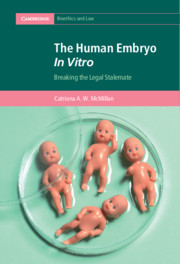
- Cited by 2
-
Cited byCrossref Citations
This Book has been cited by the following publications. This list is generated based on data provided by Crossref.
Frowde, Rhiannon L. Dove, Edward S. and Laurie, Graeme T. 2022. Reconciling fragmented sectors of health research regulation: toward an ecosystem of processual regulation. Humanities and Social Sciences Communications, Vol. 9, Issue. 1,
Cornell, Mollie and Baron, Teresa 2024. The law and ethics of a property rights approach to frozen embryo disputes. Legal Studies, Vol. 44, Issue. 2, p. 332.
- Publisher:
- Cambridge University Press
- Online publication date:
- March 2021
- Print publication year:
- 2021
- Online ISBN:
- 9781108933421


